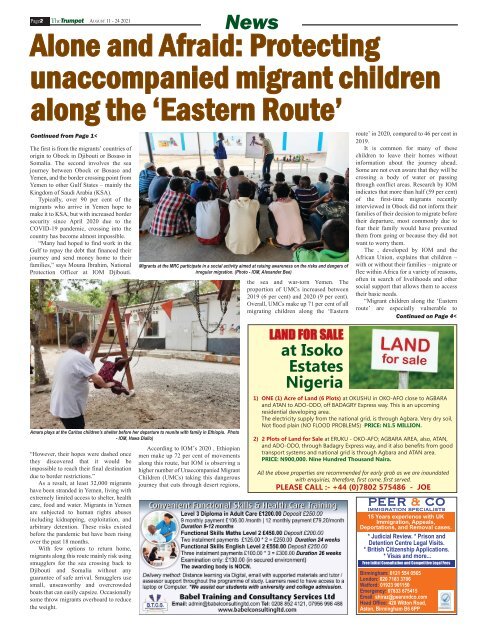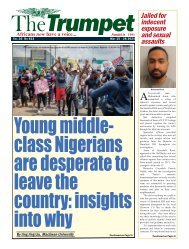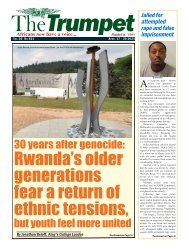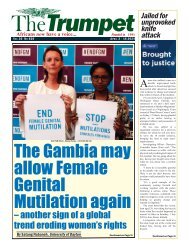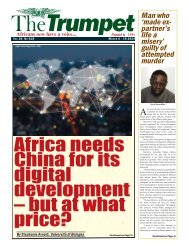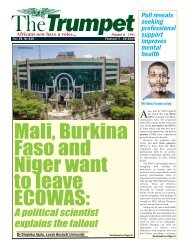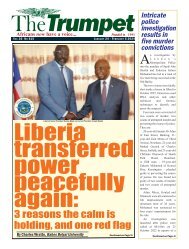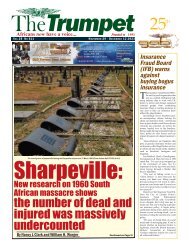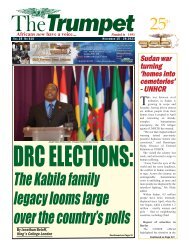The Trumpet Newspaper Issue 551 (August 11 - 24 2021)
Protecting Unaccompanied Migrant Children
Protecting Unaccompanied Migrant Children
Create successful ePaper yourself
Turn your PDF publications into a flip-book with our unique Google optimized e-Paper software.
Page2 <strong>The</strong><strong>Trumpet</strong> AUGUST <strong>11</strong> - <strong>24</strong> <strong>2021</strong><br />
News<br />
Alone and Afraid: Protecting<br />
unaccompanied migrant children<br />
along the ‘Eastern Route’<br />
Continued from Page 1<<br />
<strong>The</strong> first is from the migrants’ countries of<br />
origin to Obock in Djibouti or Bosaso in<br />
Somalia. <strong>The</strong> second involves the sea<br />
journey between Obock or Bosaso and<br />
Yemen, and the border crossing point from<br />
Yemen to other Gulf States – mainly the<br />
Kingdom of Saudi Arabia (KSA).<br />
Typically, over 90 per cent of the<br />
migrants who arrive in Yemen hope to<br />
make it to KSA, but with increased border<br />
security since April 2020 due to the<br />
COVID-19 pandemic, crossing into the<br />
country has become almost impossible.<br />
“Many had hoped to find work in the<br />
Gulf to repay the debt that financed their<br />
journey and send money home to their<br />
families,” says Mouna Ibrahim, National<br />
Protection Officer at IOM Djibouti.<br />
Amara plays at the Caritas children’s shelter before her departure to reunite with family in Ethiopia. Photo<br />
- IOM, Hawa Diallo)<br />
“However, their hopes were dashed once<br />
they discovered that it would be<br />
impossible to reach their final destination<br />
due to border restrictions.”<br />
As a result, at least 32,000 migrants<br />
have been stranded in Yemen, living with<br />
extremely limited access to shelter, health<br />
care, food and water. Migrants in Yemen<br />
are subjected to human rights abuses<br />
including kidnapping, exploitation, and<br />
arbitrary detention. <strong>The</strong>se risks existed<br />
before the pandemic but have been rising<br />
over the past 18 months.<br />
With few options to return home,<br />
migrants along this route mainly risk using<br />
smugglers for the sea crossing back to<br />
Djibouti and Somalia without any<br />
guarantee of safe arrival. Smugglers use<br />
small, unseaworthy and overcrowded<br />
boats that can easily capsize. Occasionally<br />
some throw migrants overboard to reduce<br />
the weight.<br />
Migrants at the MRC participate in a social activity aimed at raising awareness on the risks and dangers of<br />
irregular migration. (Photo - IOM, Alexander Bee)<br />
According to IOM’s 2020 , Ethiopian<br />
men make up 72 per cent of movements<br />
along this route, but IOM is observing a<br />
higher number of Unaccompanied Migrant<br />
Children (UMCs) taking this dangerous<br />
journey that cuts through desert regions,<br />
the sea and war-torn Yemen. <strong>The</strong><br />
proportion of UMCs increased between<br />
2019 (6 per cent) and 2020 (9 per cent).<br />
Overall, UMCs make up 71 per cent of all<br />
migrating children along the ‘Eastern<br />
LAND FOR SALE<br />
at Isoko<br />
Estates<br />
Nigeria<br />
route’ in 2020, compared to 46 per cent in<br />
2019.<br />
It is common for many of these<br />
children to leave their homes without<br />
information about the journey ahead.<br />
Some are not even aware that they will be<br />
crossing a body of water or passing<br />
through conflict areas. Research by IOM<br />
indicates that more than half (59 per cent)<br />
of the first-time migrants recently<br />
interviewed in Obock did not inform their<br />
families of their decision to migrate before<br />
their departure, most commonly due to<br />
fear their family would have prevented<br />
them from going or because they did not<br />
want to worry them.<br />
<strong>The</strong> , developed by IOM and the<br />
African Union, explains that children –<br />
with or without their families – migrate or<br />
flee within Africa for a variety of reasons,<br />
often in search of livelihoods and other<br />
social support that allows them to access<br />
their basic needs.<br />
“Migrant children along the ‘Eastern<br />
route’ are especially vulnerable to<br />
Continued on Page 4<<br />
1) ONE (1) Acre of Land (6 Plots) at OKUSHU in OKO-AFO close to AGBARA<br />
and ATAN to ADO-ODO, off BADAGRY Express way. This is an upcoming<br />
residential developing area.<br />
<strong>The</strong> electricity supply from the national grid, is through Agbara. Very dry soil,<br />
Not flood plain (NO FLOOD PROBLEMS) PRICE: N1.5 MILLION.<br />
2) 2 Plots of Land for Sale at ERUKU - OKO-AFO; AGBARA AREA, also, ATAN,<br />
and ADO-ODO, through Badagry Express way, and it also benefits from good<br />
transport systems and national grid is through Agbara and ATAN area.<br />
PRICE: N900,000. Nine Hundred Thousand Naira.<br />
All the above properties are recommended for early grab as we are inaundated<br />
with enquiries, therefore, first come, first served.<br />
PLEASE CALL :- +44 (0)7802 575486 - JOE<br />
PEER & CO<br />
IMMIGRATION SPECIALISTS<br />
15 Years experience with UK<br />
Immigration, Appeals,<br />
Deportations, and Removal cases.<br />
* Judicial Review. * Prison and<br />
Detention Centre Legal Visits.<br />
* British Citizenship Applications.<br />
* Visas and more...<br />
Free Initial Consultation and Competitive Legal Fees<br />
Birmingham: 0121 554 0565<br />
London: 020 7183 3706<br />
Watford: 01923 90<strong>11</strong>50<br />
Emergency: 07833 675415<br />
Email: shiraz@peerandco.com<br />
Head Office: 420 Witton Road,<br />
Aston, Birmingham B6 6PP


